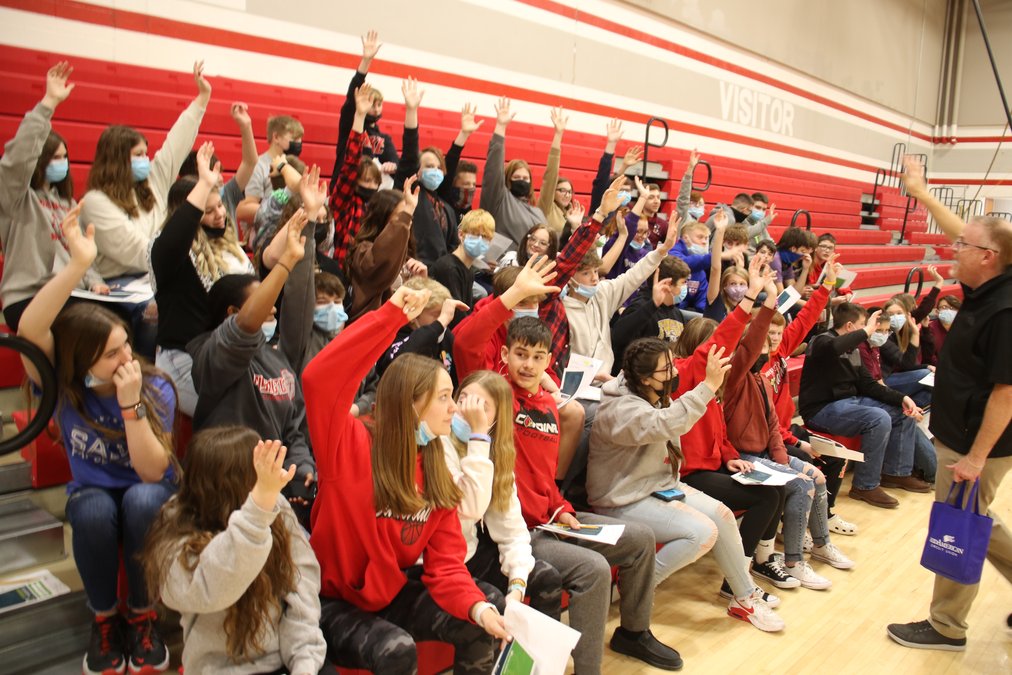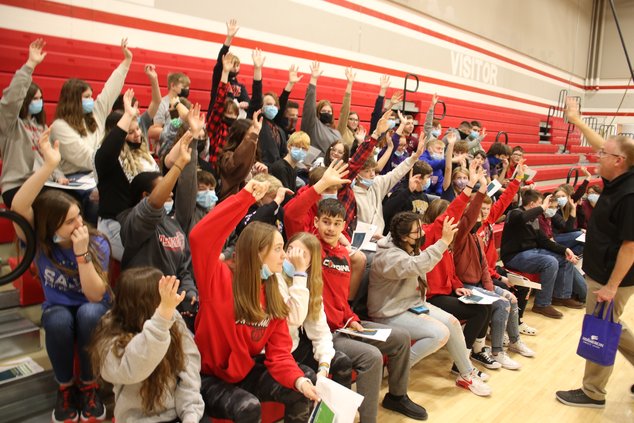HOISINGTON — The gymnasium at Hoisington Middle School may have looked like an oversized game board Wednesday, but the consequences were real.
On Wednesday, Reality U returned to Hoisington, underwritten by United Way of Central Kansas. Attending schools within UWCK’s catchment area included HMS, Larned Middle School, Central Plains, Otis-Bison, Ellinwood and St. Joseph’s Catholic in Ellinwood. The program, which focuses on eighth-grade students, rotates among the schools as hosts each year.
“Reality U is an amazing community impact project,” noted Charell Owings, UWCK executive director. “This one in particular engages students from across Barton and Pawnee Counties.
“It is a shining example of how much good you can do and how far you can stretch your dollars to make an impact when we come together,” Owings said. “We appreciate the legwork of USD 431 in providing staff, space and great hospitality. We could not do this without their partnership and the engagement from all the schools attending.”
About Reality U
Reality U is an interactive personal fiance simulation that engages early-teen students to make informed decisions about lifestyle choices that will impact their future. Developed by Wichita-based Pando Initiative, Reality U fast-forwards teens to life as a 26-year-old, beginning with an online lifestyle survey that develops a personal profile they will follow throughout the simulation. The profile includes their occupation, marital status and family, monthly income, student loan information and credit card debt that they receive on the day of the event. They are also issued a check register, in which they track credits and debits, with the stipulation that the balance can never fall to zero.
Attending Reality U
Around the gym are 12 booths that the students must visit during the session. Some of them they may have to visit more than once to make changes, but they have to sign off on each station.
The booths vary from necessary life aspects such as housing, utilities, insurance, groceries, clothing and transportation, to student loans, child care, phone and fun. The intangibles are represented by booths such as Emergency Fund and Investment; Unexpected Life Events and “Help! I Need More Money!”
Campus Life
Volunteers at each booth offered students choices offered on laminated listings, with descriptions and prices. They were also instructed that as role-players, they could accept or deny students’ choices based on their bank accounts and profiles.
At the housing booth, volunteer Lee Van Scyoc was explaining to a student that he could accept his apartment choice, but he would have to go and find a roommate to share costs.
“There are rules that they’ve got to follow,” noted Van Scyoc, who in real life is vice president and loan officer for Wilson State Bank in Hoisington. “If they have children on their profile, each child has got to have a bedroom. Some of the choices are pretty nice; one even has a backyard pool, but the price is pretty steep.”
A couple of the booths depended upon the roll of the dice. HHS Assistant Principal Bob Brungardt’s booth was Unexpected Life Events, where anything could happen and usually did.
“It’s a little like the Chance card in Monopoly,” Brungardt said. “They roll the dice and then follow what it says to do for that number.” The choices varied from cash dividends such as bank windfalls, to sudden expenses from accidents or injuries. “They might come in thinking that they’re going to get a bonus check, and leave with a broken leg,” Brungardt said.
At the Phone and Fun booth, the students learned that discretionary income doesn’t come before the household budget. “They might think they want a new iPhome or be able to go hunting, but they might have to pay extra for child care,” noted booth volunteer Kyle Haxton.
Child care also played into the choices at the “Help! I Need More Money!” booth. “They may want or need a second job, but there needs to be somebody to watch the kids,” noted booth volunteer Christa Robinson.
More lessons
Besides the booth activity, students also attended UWCK-sponsored breakout sessions in classrooms adjacent to the gym.
The sessions included: Life After High School, with Barton Community College’s Lindsey Bogner; Cost of Delinquency, with Juvenile Services’ Casey Rowland; Community Involvement, with Shane Anderek of Hoisington Fire Department/EMS; and Banking 101, with Sunflower Bank Community Development Officer Becca Maxwell.
Pando Initiative Reality U Director Patrick Sehl was on hand to coach and support students and volunteers during the simulations. At the conclusion, Sehl met with the students in a debriefing session to get their takeaways and offer his advice.
In the HMS debrief, Sehl opened with three questions:
“What was the most crazy station, was it child care?” Hands go up.
“Are kids expensive?” More hands go up, heads nod.
“Are you an expensive kid?” All hands now in the air, some waving wildly.
“Then, what you need to do when you go home today, is go home and thank your parents, for you know that you are an expensive kid and know you can do better,” Sehl said.
Sehl noted that the lessons taught at Reality U don’t end with the day’s sessions.
“There are things that we do in Reality U that can be used in other classrooms. Like in math class, balancing a checkbook and figuring compound interest,” he said. “Our goal is to teach both students and community members that they can be stakeholders in financial literacy education in their local schools.”





